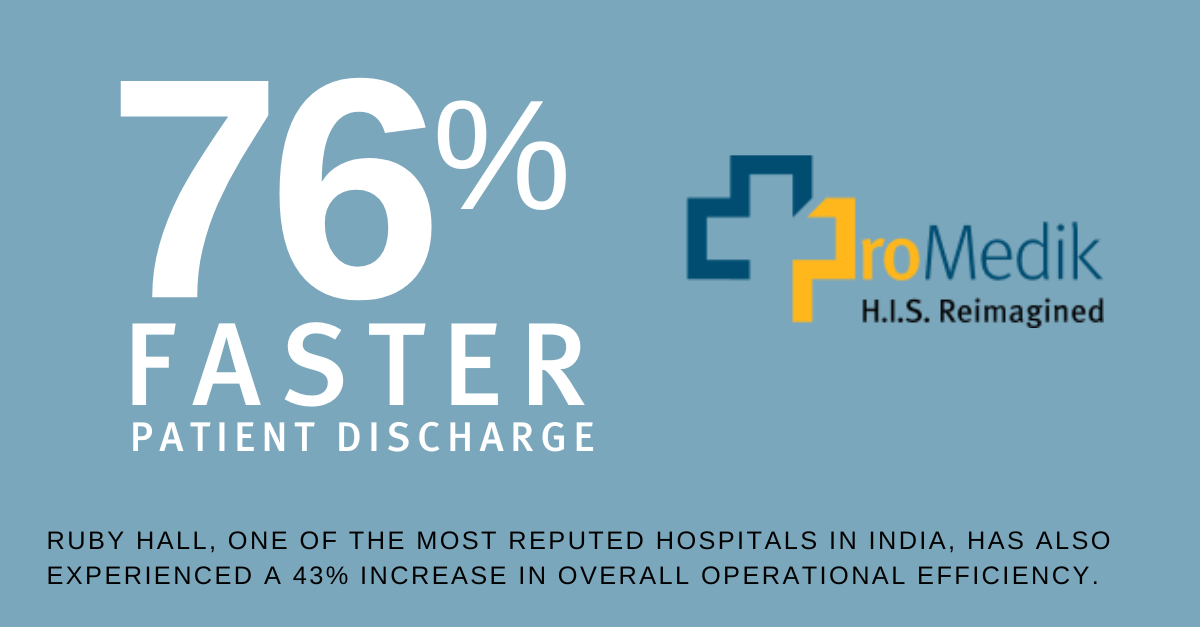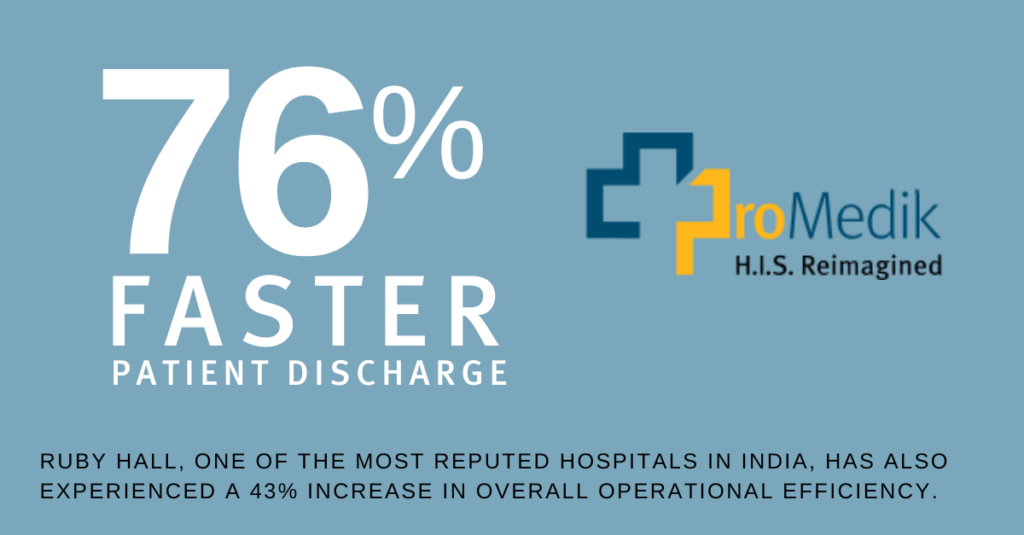
Does your medical staff often battle with endless paperwork, missing information and workflow disturbance during patient discharge? Do your patients experience discharge delays associated with the filing of medical claims or long wait times with billing? Sometimes the issues begin with the registration process and get compounded throughout the patient’s hospital stay – from a mixture of paper and paperless processes, to using disparate systems, to the lack of visibility for administrators and staff. This can impact not only the well-being of patients but that of your health care professionals who often face exhaustion and burnouts. These delays also impact hospital revenue and also play a role in patient readmittance.
Discharge delays affect patients, staff and hospitals
More than 45% of patients face a delayed discharge after completing treatment. 47.8% of those patients face a delay of 3-10 hours after the discharge papers are submitted which is also a concern and needs resolution as they impact the efficiency of medical staff. Inefficiencies in managing workflows creates a trickle down effect, jeopardizing the patient experience, potentially leading to delays in post-release treatments and follow ups.
Patients desire a comfortable experience at hospitals where everything related to their health is taken care of. Failure in providing a relaxed and comfortable experience to the patients negatively impacts their stay at hospital and their satisfaction with the staff. All these factors contribute to hospital reputation and as to how patients perceive their image.
While discharge delays do have a large impact, they can be mitigated.
5 Challenges Causing Patient Discharge Delays
We have identified five major issues that hospitals face on a day-to-day basis which impact patient discharge.:
1. Missed details during registration process can delay diagnosis and treatment
One of the most crucial steps for a seamless workflow begins with obtaining accurate and complete registration information. Quite often the medical staff responsible for this process face challenges due to the ambiguity of the manual data collection process. What data is crucial? When is certain data required to be reviewed at key points in the treatment process? What data is required by what teams? Data collection and its storage in hospitals in labor-intensive which can lead to errors and delays in data collection, further leading to delayed diagnosis and treatment.
Opting for a healthcare tool as efficient as a Hospital Information System (HIS) can help with overcoming these problems related to registration and ensuring the first phase of the patient journey is smooth and hassle-free for the staff and patients. An HIS accomplishes this by digitizing the data collection process and storing it in a centralized location. The best platform is usually cloud-based, allowing for easy access and use by multiple hospital locations, departments and personnel. All the details and real-time data medical staff need without going through mounds of paper records.
2. Disorganized workflows puts patients health at risk
Does your medical staff feel a disconnect in the various processes between departments? Is your team seeing the need for processes or having trouble updating existing processes as your hospital environment grows? Is your team having trouble adapting to the changing needs of your patients?
Patients and medical teams are impacted when workflows are disorganized (or not even in place). Medical teams need to have visibility to the big patient experience picture and understand the entire patient journey. This includes the communication opportunities between patient and medical staff and drug dispensing protocols. Any single touchpoint is challenging onto itself – and in combination throughout the patient journey can the make the difference in quality of patient care and effectiveness of medical support.
Disorganization can be overcome with an HIS that is designed with all the pain points of the patient and medical staff in mind. A good HIS platform is modular in nature and able to integrate with existing systems. It should also be scalable to expand as your hospital grows in size and volume. Ensure your HIS has a “queue” management module to give visibility and better manage length of patient stays. An HIS with patient journey mapping tracks and automates patients from the start of their care, transfer between departments, to discharge. Modern HIS systems also enable solid doctor to patient communications, streamlining appointments with real-time scheduling, SMS and email medical alerts. Drug dispensing can also be improved with HIS automations and tools to assist pharmacists in accurately managing inventory to support a safe and ethical medication dispensing process. Finally, an HIS should support the hospital’s growth strategy with custom reporting that includes everything from demographics, to departmental and financial analysis.
3. Manual labor and repetitive processes slow down the overall process
Manual processes in hospitals impact patient care. Recent research shows for 1 hour of patient care, physicians spend 2 hours completing repetitive paperwork. That is 66% of their time NOT attending to patients.
There is also often a lack of a defined structure or systems for patient transfer to the other departments in the hospital – leading to inefficient hand-offs. This may include the need to access and contact different personnel, cross checking and verifying patient information, etc.
Furthermore, like many other industries, the medical sector also suffers from a shortage of workers. The pandemic and the economic aftermath has exasperated the situation, creating heavier manual workloads.
Many hospitals need to look forward and anticipate future cost cutting, continuing staff shortages and streamlining operations. This is the perfect opportunity to work toward automating repetitive tasks. Implementing automation technologies allows medical teams to be more focused and provide more effective patient care. Offering your staff such a well-connected and integrated hospital information system can help with automation, reducing manual labor while improving processing speeds.
4. Mediclaims take a long time to process
Mediclaims is one of the most time-consuming processes at the hospital due to the need for the accurate documentation, a diligent review process, and complicated authorization process from the insurance companies. Since 41% of the population in India is today insured with medical insurance coverage, this means 4/10 patients experience a slower patient discharge experience.
All these issues can be resolved efficiently with an HIS that offers the ease of managing the Mediclaim procedure for hospitals. For instance, Ruby Hall Hospital, one of India’s leading hospitals, uses ProMedik HIS as it offers the features of submitting online medical insurance claims, submitting pre-authorized requests to insurance companies directly, and much more.
5. Extended wait period for Medical Billing process
Patients often look for a seamless experience when it comes to medical billing and after-care services. Medical billing is one of the vital aspects of discharge. Instances of missing information, duplication, typos and insurance changes in the medical bill are some of the several challenges that medical staff often struggle with. These aspects can negatively impact a hospital’s reputation and also stress the staff working there.
Several hospitals struggle with fast tracking the final settlement with patients due to a lack of automated process or a tool that can aid with gathering all the necessary billing information in one place and sharing it with the billing department at a single point. Discrepancies in the medical billing or the inaccuracy in it can often lead to long delays in patient discharge. The medical staff will agree that more than 60% of the patients have faced a delay in their discharge due to issues with medical bills. An HIS with detailed medical billing modules can help with improving the process for medical billing and settlement with patients.
5 Ways HIS improves patient discharge efficiency
- Cloud-based platform can digitize data collection, provide more secure data storage, allow for greater accessibility and overall better data management
- Optimizes workflow management to gain efficiencies and improve patient satisfaction
- Uses automation to streamline processes like Admission, Transfers and Discharge
- Pre-authorization of Mediclaim’s improves processing timing
- Digitize medical billing to ensure accuracy, accessibility and easy editing
Hospitals today need a well-thought and digitized platform that can integrate all the touchpoints for patients and make their journey easy.
A comprehensive hospital information system or HIS can be an answer to all these challenges as it is designed to provide an integrated process that includes all the aspects of patient experience in the hospitals starting from the admission of the patient until their discharge. Having a unified platform that provides all the needed information to the professionals in real-time can cut down the hassle of verifying several documents along with fast-tracking the process.
While it is relatively easy to find a Hospital information System that promises to deliver everything in one place, yet it is challenging to find the HIS that is ideal for your hospital or offers the flexibility of customizing it as per your requirements.
ProMedik Hospital Information System
This leading end-to-end hospital management solution offers an extensive range of features that can help with better management, improved workflow and speedy patient discharge. The platform is easy-to-use, intuitive and integrated which makes it an excellent tool for the staff and everyone working at the hospital.

